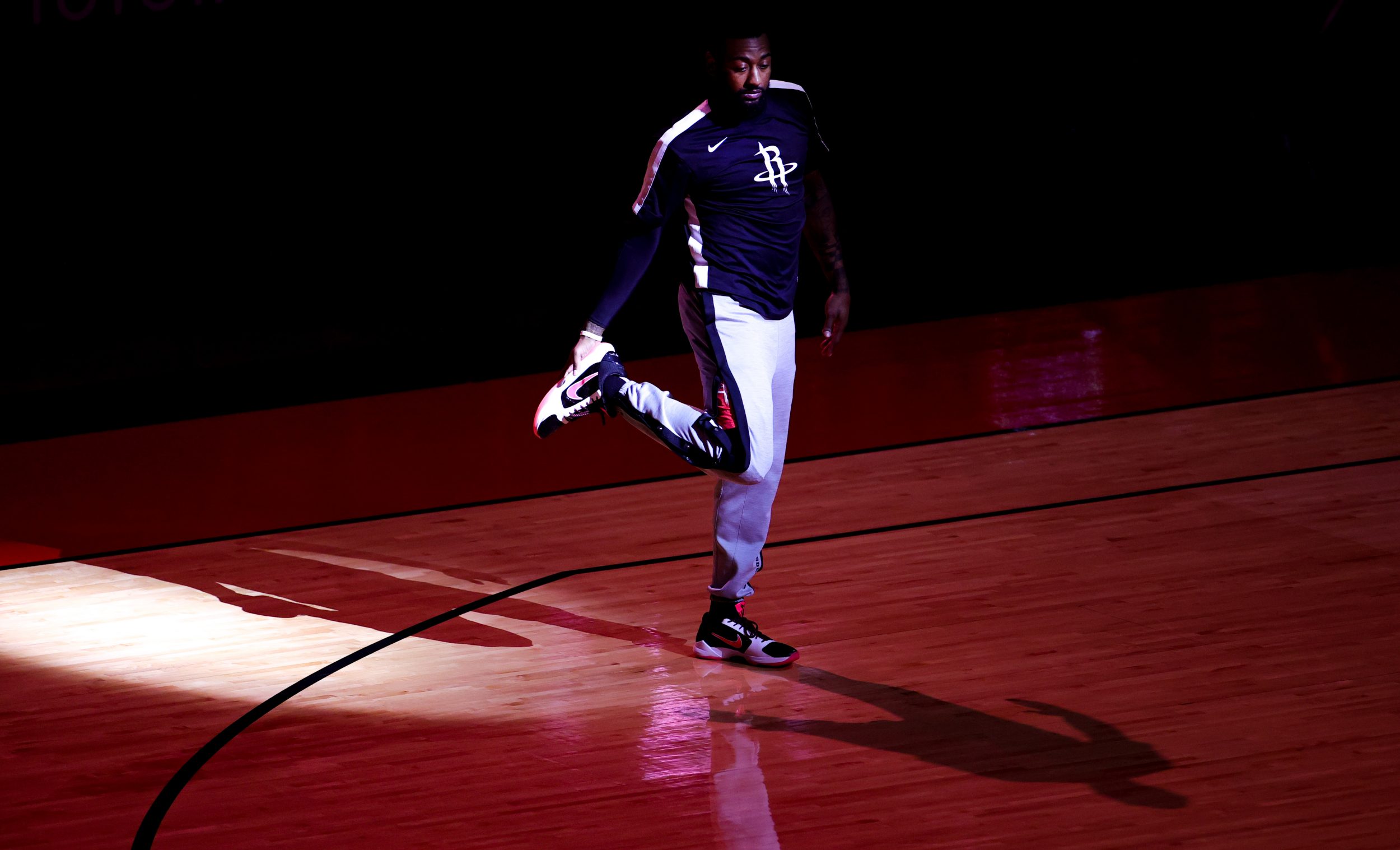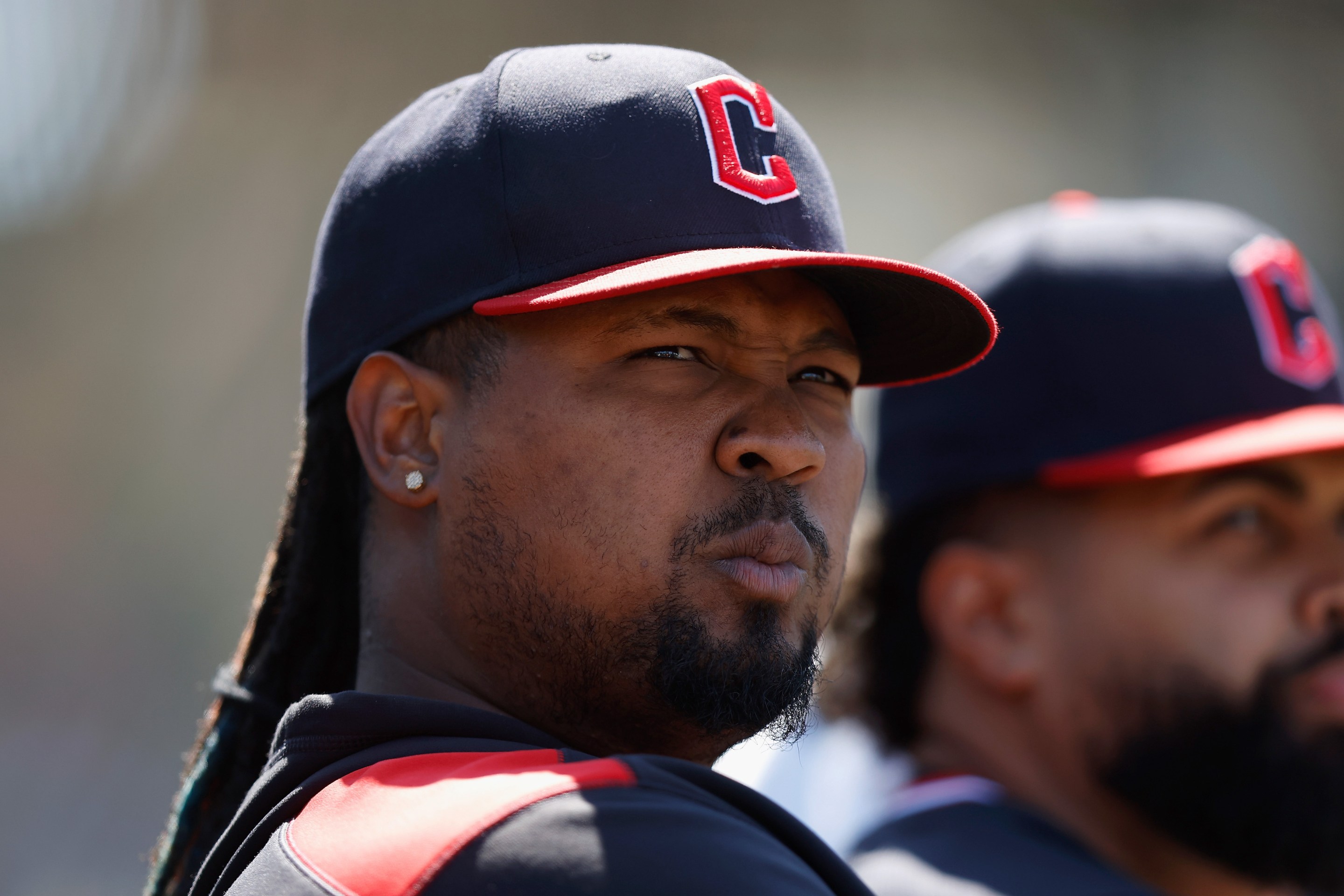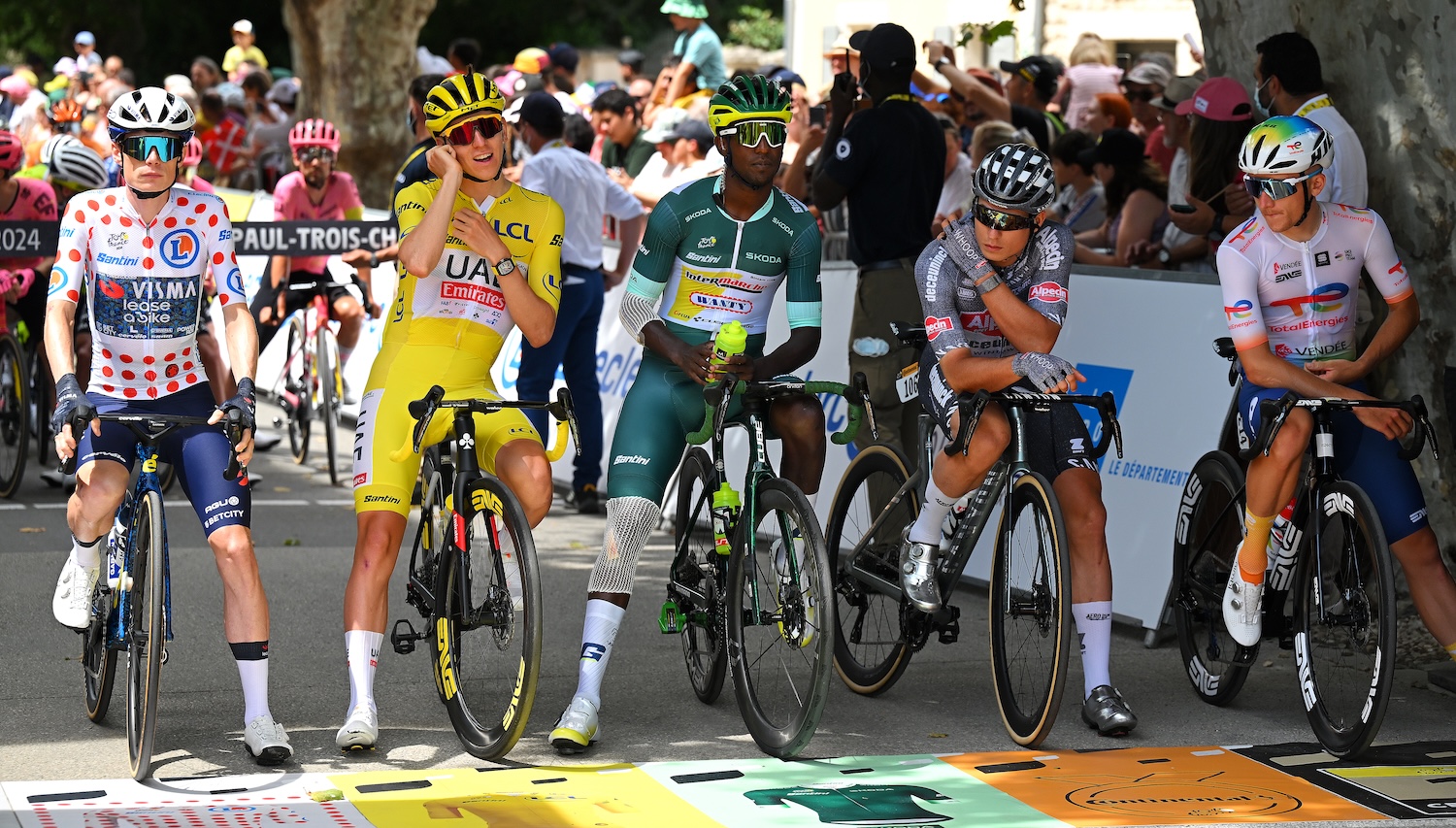The Houston Rockets have reportedly decided to transition away from paying John Wall to play basketball. Their goal is to find a trade partner who can absorb Wall's contract within the complicated limits of the NBA's salary cap and luxury tax system. Between now and the time that such a trade is consummated, the Rockets will pay Wall to stay off the court. This will be no minor expense: Wall, entering his age–31 season, will earn $44.3 million between now and April 10. He is the second-highest paid player in all of basketball.
The Rockets, owned by fake-rich debt-haver and business moron Tilman Fertitta, are at the very beginning stages of a complete roster overhaul. It may seem to fans like the team has been withering under Fertitta's stewardship for a lifetime, but in fact he took over ownership of the team in September of 2017, in the run-up to Mike D'Antoni's second season as head coach and at the peak of the James Harden era. This may interest you to know: Despite squawking defensively about his determination to pay whatever it costs to build a contending team around Harden, Fertitta's Rockets have only gotten cheaper under his watch. They came in just shy of a million bucks under the NBA's luxury tax threshold in that 2017–18 season; then $1.9 million under in his second season; then $5.3 million under in his third. Not coincidentally, the Rockets went from winning 79 percent of their games in 2017–18 to 65 percent to 61 percent, eventually had to utterly scrap anything even remotely resembling positional basketball in order to function, and wound up burning out and losing both D'Antoni and longtime general manager Daryl Morey. By January of Fertitta's fourth season as owner, Harden had forced his way out of town, and the roster was in shambles.
Wall joined the Rockets on the far side of the organization's breaking point. Morey quit in October 2020; Rafael Stone, his replacement, took over a team with not one but two superstars agitating for trades, and unloaded the unhappy and glaringly post-prime Russell Westbrook to the Wizards in December, in a trade that brought back Wall plus a draft pick. Wall was coming off of two dismal years all but lost to catastrophic leg injuries; with three years and a whopping $133 million then left on just the third "supermax" designated veteran extension ever signed by an NBA player, Wall's contract was and is considered one of the very worst bargains in the league's history. The Rockets, under a new head coach and a new general manager and very obviously flailing, tried to position Wall as a promising sidekick and complement to Harden and a potential piece of another contending Rockets team. Harden, because he is not a moron, was not convinced.
The takeaway there is not that Wall, due to injuries and aging, had become a player who sucks at basketball. That probably overstates the extent of his decline by quite a lot, although he will probably never again be anything close to what he was at his dazzling best. Because of the way the league's salary cap structure and contract limits and luxury tax threshold work to suppress player movement and salaries, and because the NBA is an association of franchises controlled by skimming billionaire shitbags whose primary interest is in burnishing their personal wealth and enjoying the unearned prominence and exclusivity of professional sports team ownership, well-paid players inevitably brush up against a harsh, cruel, terrifying threshold: Once the perception that a player represents negative value on an expensive contract outstrips the productivity and reputation and star power that earned them their big payday, in the wrong circumstances they can flash all the way over to the realm of toxic assets.
Nate Duncan and Danny Leroux of the very good Dunc'd On podcast even have a term for this, applying what they call "the Nene Test" to pretty much any player earning more than minimum salary in order to determine whether their contract is considered an asset or a burden. The formulation is subjective but the logic is familiar to anyone who's read Moneyball or watched the Tampa Bay Rays or celebrated the roster-building prowess of, well, Daryl Morey: Players who are underpaid for production are good and positive, not only for the dismally familiar payroll reasons but also because they are much easier to stack together and slide around in transactions in a league that enforces soft and hard salary caps and expensive and multiplying tax penalties for, uhh, paying lots of good players at the same time. Players who are expensive are only positive value to the extent that there are other, cheaper players who are not as productive or more productive. The real fucked-upedness of this calculus is revealed by players who are appropriately paid for their relative level of productivity. By earning salaries that reflect their real-world value to the league and a team and to winning basketball, they ride the very edge of negative value in roster construction. The draft and rookie scale contracts ensure that every year the league is flush with a few dozen young guys with tantalizing potential and cheap deals granting several years of team control. Appropriately paid guys are never not in danger of tipping over into the dreaded burden zone.
A perfectly healthy John Wall—the 2016–17 vintage, good for 23 points, 11 assists, and two steals a night as the best player on a team that narrowly missed the conference finals in consecutive seasons—was riding the edge of negative value, at best, the very moment he put pen to ink on that supermax extension. That's not fair: Wall had been carrying around a chronically dysfunctional, Ernie Grunfeld-laden Wizards franchise for the better part of seven years, almost singlehandedly willing them to a position of fringe prominence and a modest but utterly uncharacteristic four-year run of moderate success. Their adorably unserious 49 wins in the 2016–17 season were nevertheless the most for a Wizards or Bullets team since 1979. No one associated with the organization can possibly have suffered any confusion about who'd done the heavy lifting; for a team and fanbase that had by then been a laughingstock for generations, a cool and young and incredibly telegenic player who could hoist their decades-worth of ridiculous bullcrap onto his shoulders and carry the whole mess to respectability had—and more importantly earned and should've had—infinite value. The extension should've come with a literal throne and crown, and should've been for life.
But that's not how NBA contracts are allowed to work. Collectively bargained restrictions limit even the best players to contracts of no more than five seasons, and limit franchises to team annual salary totals equal to less than three times the value of one supermaxed veteran. By signing for just a portion of what he was worth to the shit-ass Wizards, Wall had made it so that the Wizards were left with only 65 percent of the salary cap to build a whole roster of players around him. Bad luck took over: A debilitating lower leg injury hobbled Wall through his first two post-extension seasons, damaging his reputation and perceived value around the league; and then a catastrophic Achilles tendon tear cost him all of the 2019–20 season, booting him all the way to the extreme edge of the wrong side of Dunc'd On's Nene Test. When all it cost for the Wizards to flip their recent franchise cornerstone for a disgruntled and declining Westbrook was one lottery-protected first-round draft pick, this was considered a tidy and commendable piece of business. The pick reflected Wall's negative value; it was only Westbrook's nearly equal negative value, on his own supermax deal, plus Houston's very public desperation that kept the price of dumping Wall so manageable.
This shit is all so warping and distorting that I find myself mourning a four-year-old version of Wall, as if by sliding into negative contract value he has effectively died. He's not dead! He is, in fact, still a very cool basketball player.
He will never be as cool as he was at what turned out to be his athletic prime, and that's a shame, but you can probably still orient a competent or at least coherently organized offense around his playmaking, if only for a few full-speed minutes at a time. A team otherwise stocked with capable players but in need of ball-handling and switchable defenders—importantly, a team that was interested in improving now and not kicking respectability down the road a few years—could do worse than a 10-year veteran with size and skill advantages over a solid two-thirds of the players at his position. Wipe his salary out of it, and even Wall's latest game-tested iteration is still a good and perfectly usable NBA player. Factor that salary back in, and it will be difficult bordering on impossible for any good team to find room for Wall on their roster while keeping their other good and appropriately paid players. It's a trap. By rescuing a shitty bottom-feeder and earning a huge payday, Wall essentially nuked all but the longest-shot chances that he will play for non-bottom-feeders during the back-half of his career.
The Rockets are one of far too large a handful of NBA teams who have no interest in immediate improvement, and the league around them is not set up to incentivize short-term improvement in the bottom half of the standings. The conversation around this problem always manages to center around the annual player draft, and to ignore how salary caps and designated veterans and luxury taxes and trade restrictions all work to make the pursuit of competence more fraught and perilous than complacency in irrelevance. And that's before we even get to the part where traditionally hierarchical organizations naturally force quality to wrestle with the imperative that profits flow to the top of the pyramid. We don't even have to get into the true commie shit to see that this system sucks mondo ass.
The price of offloading Wall will probably not be nearly as low for the Rockets as it was for the Wizards, but this is where the fruits of the teardown necessitated by Fertitta's determined cheapskatery will pay off. The Rockets used four first-round picks in the 2021 draft to load up with exciting youngsters, including super-prospect Jalen Green. Between now and 2027 they control at least four first-round draft picks in addition to their own. Their own picks will have tremendous trade value for as long as their roster is pure crud, and their roster will be pure crud, in the loaded Western Conference, for a period of years. If it costs a handful of picks to offload Wall's negative-value contract onto some other contentedly cratering, asset-collecting bottom-feeder—looking at you, Oklahoma City—they've got the ammunition. All it will take in return, in order to satisfy the CBA's salary-matching restrictions on trades, is a handful of moderately paid but replacement grade veterans, and those guys, due to their own precarious proximity to negative value, are for sure worth a package of first round picks.
In this respect it's helpful, in the end, to have some guys who are paid respectably, if only to grease the skids of sleazy asset collection ventures. The chances of Wall landing on a good or even decent team are depressingly low; the team that absorbs the remaining years on his contract will be humiliating itself and Wall, and neither the player nor the team will have much hope of playing competitive basketball in the near future. The NBA has made it so that only one of them would have any reason to care about all that hopelessness, but that at least they will both be well-compensated for it.







